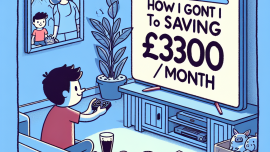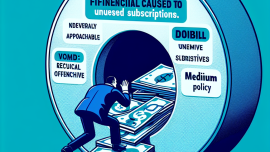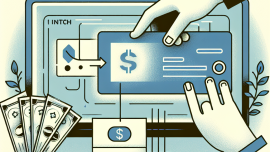
How I Accidentally Boosted My Credit Score in 6 Months
Why Budgeting Is the First Step to Financial Freedom
Let’s face it: when most people hear the word “budget,” their eyes glaze over and their brain starts preparing the next excuse—something involving coffee, laundry, or possibly a sudden desire to clean behind the fridge. But budgeting isn’t the prison sentence it’s made out to be. In fact, it’s your golden ticket to financial freedom. And yes, I said freedom. It’s not only for accountants in beige suits or those hyper-organized types with color-coded spreadsheets. It’s for you—whether you’re starting your first job or trying to get a grip on where your money keeps disappearing to like socks in a dryer.
Hi, I’m Tom. I’m that finance guy who’s been through it all—salary surprises, ramen-for-dinner weeks, and the thrill of finally having a savings account that isn’t just a temporary stop for your paycheck. Let me walk you through why budgeting matters, how to start one, and how it can turn you from “Where did all my money go?” to “Hey, I got this.”
What Is a Budget, Really?
Let’s not overcomplicate things. A budget is a plan for your money. That’s it. It tells your dollars where to go instead of wondering where they went. You don’t need to be a math wizard or use elaborate software (although apps can help). All you need is a clear picture of what’s coming in, what’s going out, and what’s left over.
Think of it like GPS for your money. If you don’t set a destination (your financial goals), and don’t track your route (spending), you could end up lost in the land of overdrafts and maxed-out credit cards.
Why Budgeting Is the Foundation of Financial Freedom
1. It Gives You Control
Without a budget, you’re basically playing financial roulette every month. Budgeting puts you back in the driver’s seat. Knowing exactly what you earn and spend clears the fog and shows you where your money can work harder—maybe cutting those five streaming subscriptions down to just… three?
2. It Helps You Set and Hit Goals
Want to save for a vacation? Pay off student loans? Finally buy a bed frame like a grown-up? Whatever your dreams, a budget helps you build a realistic path toward them. Every dollar you assign to a goal brings you one step closer. It’s like crowd-funding your future—except you’re the only contributor and the only beneficiary. Talk about efficiency.
3. It Reveals What’s Not Working
I once thought I had a “small coffee habit.” That is, until I saw my monthly coffee shop spending and realized I was basically funding a full barista’s salary. Budgeting shows you these blind spots. It’s not about guilt—it’s about awareness. If you truly value something, keep it! But make sure it fits into your plan.
4. It Prepares You for Emergencies
Tires go flat. Phones fall—screen-first onto concrete. Life happens. A solid budget includes an emergency fund, which is your financial airbag. You hope never to need it, but you’ll be glad it’s there when life throws you a curveball with bad timing.
How to Start Budgeting (Without Losing Your Sanity)
Here’s where we get practical. And I promise—no spreadsheets from the Stone Age.
Step 1: Know Your Income
Start with your net income—the amount you take home after taxes and deductions. If you freelance or have irregular income, use an average from the past 3–6 months, and be conservative (aim low to be safe).
Step 2: Track Your Expenses
This is where most people go “Ugh.” But you’ve got to analyze your spending before you can start telling your money what to do. Look at the past month or two. Categorize your expenses, like:
- Housing: rent or mortgage, utilities
- Food: groceries, takeout, snacks
- Transportation: gas, public transit, parking
- Debt payments: credit cards, student loans
- Entertainment: subscriptions, hobbies, nights out
Step 3: Choose a Budgeting Method
There are several methods, and they all work—as long as you **use** them. Some popular approaches include:
- Zero-Based Budget: Every dollar has a job. Income minus expenses equals zero. Not zero in the bank—zero unassigned dollars.
- 50/30/20 Rule: 50% needs, 30% wants, 20% savings/debt repayment. Easy to remember, harder to master immediately.
- The Envelope System: Old-school but super effective. Allocate cash into envelopes for each category and stop spending when it’s empty. There are digital versions too.
Step 4: Review and Adjust Monthly
Budgets aren’t statues—they’re living, breathing documents. Review yours monthly. Did you overspend on dining out? Forgot that annual renewal fee? Adjust and keep going. Improvement trumps perfection every day of the week.
Troubleshooting Common Budgeting Problems
“I Can’t Stick to It”
Been there. A budget that’s too tight or unrealistic is a recipe for rebellion. Build in some fun money. Track your wins. Reward progress. And remember: this is about controlling your money—not removing joy from your life.
“Unexpected Expenses Blow It Up”
Include a buffer. Even $50 a month unallocated can soften unexpected costs. And if you have to dip into another category to cover a surprise, that’s fine. You’re learning. Keep adjusting.
“I Don’t Earn Enough to Budget”
Nope. Especially because your income is tight, you need a plan. A budget ensures essentials are covered first and stops you from accidentally spending next week’s grocery money on impulse buys this weekend.
Start Simple. Start Today.
You don’t need to overthink it. Start with a notebook. Or try a free budgeting app. The point is to **start**. I’ve seen people turn their finances around not with big raises, but with small, consistent changes that began with budgeting. That’s the secret—steady habits beat lucky windfalls any day.
And remember, you’re not alone on this journey. The fact that you’re reading this means you’ve already taken the first step. So pat yourself on the back, fire up that spreadsheet/app/notepad, and give your money a mission.
Want help or tips tailored to your situation? Feel free to contact us. And if you’re curious about the people behind Financeone, check out our About Us page.
Now go budget like a boss.









Leave a Reply